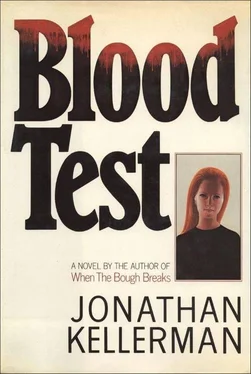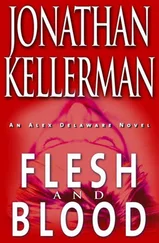Jonathan Kellerman - Blood Test
Здесь есть возможность читать онлайн «Jonathan Kellerman - Blood Test» весь текст электронной книги совершенно бесплатно (целиком полную версию без сокращений). В некоторых случаях можно слушать аудио, скачать через торрент в формате fb2 и присутствует краткое содержание. Город: New York, Год выпуска: 1986, ISBN: 1986, Издательство: Atheneum, Жанр: Триллер, на английском языке. Описание произведения, (предисловие) а так же отзывы посетителей доступны на портале библиотеки ЛибКат.
- Название:Blood Test
- Автор:
- Издательство:Atheneum
- Жанр:
- Год:1986
- Город:New York
- ISBN:978-0689116346
- Рейтинг книги:4 / 5. Голосов: 1
-
Избранное:Добавить в избранное
- Отзывы:
-
Ваша оценка:
- 80
- 1
- 2
- 3
- 4
- 5
Blood Test: краткое содержание, описание и аннотация
Предлагаем к чтению аннотацию, описание, краткое содержание или предисловие (зависит от того, что написал сам автор книги «Blood Test»). Если вы не нашли необходимую информацию о книге — напишите в комментариях, мы постараемся отыскать её.
Blood Test — читать онлайн бесплатно полную книгу (весь текст) целиком
Ниже представлен текст книги, разбитый по страницам. Система сохранения места последней прочитанной страницы, позволяет с удобством читать онлайн бесплатно книгу «Blood Test», без необходимости каждый раз заново искать на чём Вы остановились. Поставьте закладку, и сможете в любой момент перейти на страницу, на которой закончили чтение.
Интервал:
Закладка:
That kind of paternalism bred a make-nice approach exemplified by the formal coexistence between the town and the Touch. On the positive side it could lead to tolerance, on the negative, tunnel vision.
I couldn’t turn to Houten for help. He wouldn’t welcome inquiries by outsiders under any circumstances and the hassles with Raoul were certain to have firmed his defenses. Neither could I waltz into town and strike up conversations with strangers. For a moment it seemed hopeless, La Vista a locked box.
Then I thought of Ezra Maimon.
There’d been a simple dignity and independence of spirit about the man that had impressed me. He’d walked into a mess and cleaned it up within minutes. Representing an outside trouble-maker’s interests against those of the sheriff could have proved intimidating to a less resolute man. Maimon had taken the job seriously and had done it damn well. He had spine and smarts.
Equally important, he was all I had.
I got his number from information and dialed it.
He answered the phone “Rare Fruit and Seed Company” in the same quiet voice I remembered.
“Mr. Maimon, Alex Delaware. We met at the sheriff’s station.”
“Good afternoon, Dr. Delaware. How is Dr. Melendez-Lynch?”
“I haven’t seen him since that day. He was pretty depressed.”
“Yes. Such a tragic state of affairs.”
“That’s why I called you.”
“Oh?”
I told him of Valcroix’s death, the attempt on my life, and my conviction that the situation would never be resolved without delving into the history of the Swopes, finishing with a straight-out plea for help.
There was silence on the other end and I knew he was deliberating, just as he had after Houten presented his case. I could almost hear the wheels turning.
“You’ve got a personal stake in this,” he said finally.
“That’s a big part of it. But there’s more. Woody Swope’s disease is curable. There’s no reason for him to die. If he’s alive I want him found and treated.”
More silent cerebration.
“I’m not sure I know anything that will help you.”
“Neither am I. But it’s worth a try.”
“Very well.”
I thanked him profusely. We agreed that meeting in La Vista was out of the question. For both our sakes.
“There’s a restaurant in Oceanside named Anita’s where I dine regularly,” he said. “I’m a vegetarian and they serve fine meatless cuisine. Can you meet me there at nine tonight?”
It was five forty. Given even the heaviest traffic, I’d make it with time to spare.
“I’ll be there.”
“All right, then, let me tell you how to find the place.”
The directions he gave were as expected: simple, straight-forward, precise.
I paid for another two nights at the Bel Air, returned to my room and called Mal Worthy. He was out of the office but his secretary volunteered his home number.
He picked up on the first ring, sounding weary and drained.
“Alex, I’ve tried to get you all day.”
“I’m in seclusion.”
“Hiding? Why? He’s dead.”
“It’s a long story. Listen, Mal, I called for a couple of reasons. First, how did the children take it?”
“That’s what I wanted to talk to you about. To get your advice. What a goddamned mess. Darlene didn’t want to tell them but I told her she had to. I spoke to her afterward, and she said April cried a lot, asked questions, wouldn’t let go of her skirt. She couldn’t get Ricky to talk. Kid clammed up, went into his room and wouldn’t come out. She had lots of questions and I tried my best to answer them but it’s not my area of expertise. Do those reactions sound normal?”
“Normal or abnormal isn’t the issue. Those kids have had to deal with more trauma than most people encounter in a lifetime. When I examined them in your office I felt they needed help and said so. Now it’s absolutely necessary. Make sure they get it. In the meantime keep an eye on Ricky. He identified strongly with his father. Imitative suicide isn’t out of the question. Neither is arson. If there are guns in the house get rid of them. Tell Darlene to watch him closely — keep him away from matches, knives, ropes, pills. At least until she gets him into therapy. After that she should do what the therapist says. And if the kid starts expressing his anger she should make sure not to clamp down. Even if it gets abusive.”
“I’ll pass it on. I’d like you to see them once they get back to L.A.”
“I can’t, Mal. I’m too close to the whole thing.” I gave him the names of two other psychologists.
“All right,” he said, with some reluctance. “I’ll give her the referrals, make sure she calls one of them.” He paused. “I’m staring out the window. Place looks like a barbecue pit. Firemen sprayed it with something that’s supposed to make the smell go away but it still stinks. I keep wondering if it could have turned out differently.”
“I don’t know. Moody was programmed for violence. He had a violent upbringing. You remember the history — his own father was explosive, died in a brawl.”
“History repeats itself.”
“Get that boy in therapy and maybe it won’t.”
The whitewashed walls of Anita’s Café were backlit by lavender-tinted bulbs and trimmed with used brick. The entrance was through a lattice-wood arch. Dwarf lemon trees had been espaliered to the lattice and the fruit glowed turquoise in the artificial light.
The restaurant was tucked away, incongruously, in an industrial park, flanked on three sides by black-glass office buildings, acres of parking lot on the fourth. The songs of nightbirds mingled with the distant roar of the highway.
Inside, it was cool and dim. Baroque harpsichord music issued forth at low volume. The aroma of herbs and spices — cumin, marjoram, saffron, basil — saturated the air. Three quarters of the tables were occupied. Most of the diners looked young, hip, affluent. They spoke earnestly in subdued tones.
A stout blond woman in peasant blouse and embroidered skirt showed me to Maimon’s table. He rose in a courtly gesture and sat when I did.
“Good evening, Doctor.” He was dressed as before: spotless white shirt, pressed khaki trousers. His eyeglasses had slid down his nose and he pushed them back into place.
“Good evening. Thank you very much for seeing me.”
He smiled.
“You stated your case eloquently.”
The waitress, a slender girl with long dark hair and a Modigliani face, came to our table.
“They make an excellent lentil wellington,” said Maimon.
“That sounds fine.” My mind wasn’t on food.
He ordered for both of us. The waitress returned with ice water in cut-crystal goblets, pillowy slices of whole-wheat bread and two small tubs of vegetable pâté that tasted uncannily like the real thing. A paper-thin lemon slice floated in each glass.
He spread pâté on bread, took a bite, chewed slowly and deliberately. After he swallowed he asked, “How can I help you, Doctor?”
“I’m trying to understand the Swopes. What they were like before Woody’s illness.”
“I didn’t know them well. They were secretive people.”
“I keep hearing that.”
“I’m not surprised.” He sipped his water. “I moved to La Vista ten years ago. My wife and I were childless. After she died I retired from my law practice and opened up the nursery — horticulture had been my first love. One of the first things I did after settling in was to contact the other growers in the area. For the most part I was welcomed warmly. Traditionally, horticulturists and orchardists are cordial people. So much of our progress depends upon cooperation — one grower will obtain seeds from an unusual species and distribute it to the others. It’s in the best interests of all — scientifically and economically. A fruit that no one tastes will eventually die out, as did so many of the old American apples and pears. One that achieves some degree of circulation will survive.
Читать дальшеИнтервал:
Закладка:
Похожие книги на «Blood Test»
Представляем Вашему вниманию похожие книги на «Blood Test» списком для выбора. Мы отобрали схожую по названию и смыслу литературу в надежде предоставить читателям больше вариантов отыскать новые, интересные, ещё непрочитанные произведения.
Обсуждение, отзывы о книге «Blood Test» и просто собственные мнения читателей. Оставьте ваши комментарии, напишите, что Вы думаете о произведении, его смысле или главных героях. Укажите что конкретно понравилось, а что нет, и почему Вы так считаете.












